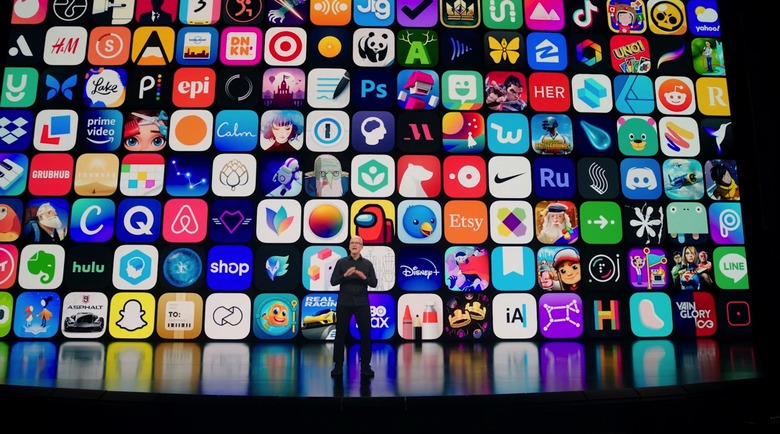Tim Cook Just Explained Why You Can't Install Any App You Want On iPhone
Unlike other computers that let users install any applications they desire, the iPhone and iPad can only get apps from a single place, at least officially. Apple's App Store is the only application store on iOS and iPadOS devices, and that's actually much better than it sounds. The App Store contains a massive number of free and premium apps and games. On top of that, developers continue to create new experiences, and most tend to start with the iPhone. It's only later that Android gets the same apps.
Apple's tight control over the App Store has drawn plenty of criticism and scrutiny recently. Regulators are increasingly more interested in how big tech does business, and Apple is included in the list. Separately, Epic Games has sued Apple over its App Store policies in a highly publicized case that might have a larger impact on the entire App Store business model in the future. Epic wants Apple to allow alternate app stores on the iPhone, as well as alternate payment methods.
In a wide-ranging interview about its products, Apple CEO Tim Cook explained exactly why users couldn't install anything they want on iPhone. The answer will not surprise anyone who has been using iPhone and iPad for a few years, as Cook made the same argument before. It's all about ensuring the security of users.
Cook told Brut in a video interview that privacy is a primary focus for Apple's strategy for the future. This is also in line with Cook's remarks about privacy in recent years. "We see it as a basic human right, a fundamental human right," Cook said of privacy.
"You can think of a world where privacy is not important, and the surveillance economy takes over, and it becomes a world where everyone is worried that somebody else is watching them, and so they begin to do less, they begin to think less, and nobody wants to live in a world where that freedom of expression narrows," the CEO said.
Cook added that Apple supports regulatory scrutiny like the European GDPR law meant to improve user privacy in the European Union. He said Apple would support additional privacy-related regulations. But Cook explained there are parts of the tech regulations that are currently discussed that are "not in the best interests of the user."
He offered an example of a regulatory measure that would work against the consumer. In his view, "the current DMA language that is being discussed would force sideloading on the iPhone."
Sideloading is a term used to describe the practice of installing apps that haven't been approved in the official application store. It's impossible to sideload apps on iPhone without jailbreaking it beforehand. But Android allows it.
Sideloading "would destroy the security of the iPhone and a lot of the privacy initiatives that we've built into the App Store, where we have privacy nutrition labels and App Tracking Transparency... these things would not exist anymore," he said.
The latter privacy features were introduced with iOS 14, prompting vehement criticism from Facebook this year. The social network saw its bottom line threatened by Apple's new privacy features. The privacy labels forced it to show users how much personal information Facebook collects. The anti-tracking feature forced Facebook to ask the user's permission to track them across apps and online services. Apple can only enforce these privacy features because it controls the way apps are installed on iPhone and iPad.
Cook also compared iPhone to Android, where sideloading is possible, explaining there's more malware on Google's OS than on iOS. "Android has 47 times more malware than iOS does," Cook said. "It's because we've designed iOS in such a way that there's one app store, and all of the apps are reviewed prior to going on the store. And so that keeps a lot of this malware stuff out of our ecosystem, and customers have told us very continuously how much they value that, and so we're going to be standing up for the user in the discussions."
Cook did not talk only about iPhone security and privacy. He addressed other aspects of Apple's business, including health, augmented reality, and even cars. The full interview with Brut follows below.
